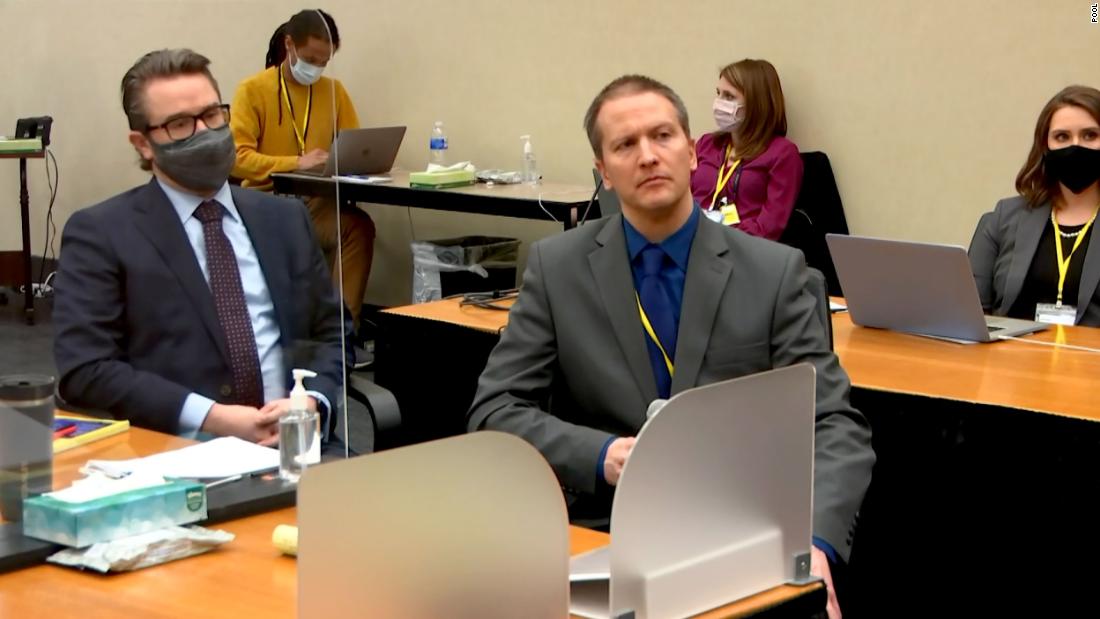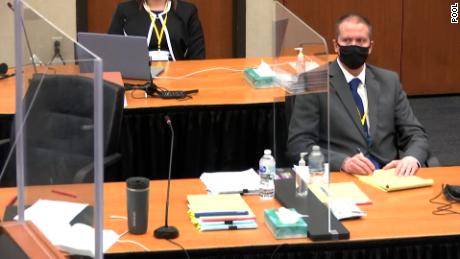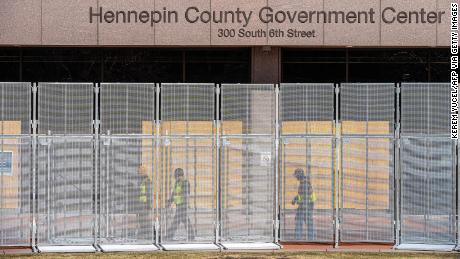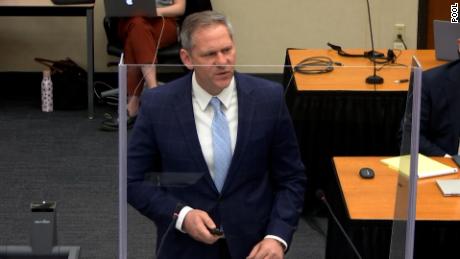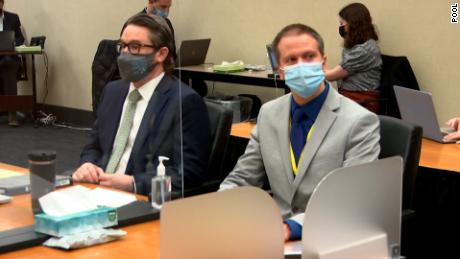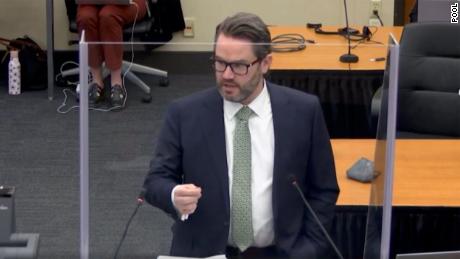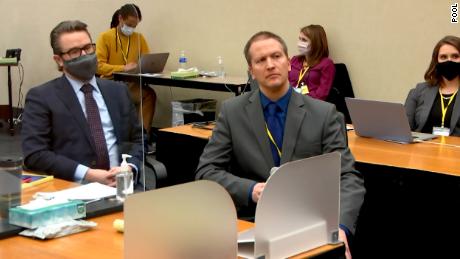Chauvin kneeled on George Floyd for more than 9 minutes because of ex-officer’s pride and ego, prosecutor says
“He was not going to let these bystanders tell him what to do. He was going to do what he wanted, how he wanted, for as long as he wanted. And there was nothing, nothing they can do about it because he had the authority. He had the power, and the other officers, the bystanders were powerless,” prosecuting attorney Steve Schleicher said. “He was trying to win, and George Floyd paid for it with his life.”
The comments about Chauvin’s pride and ego were the first time prosecutors have specifically discussed Chauvin’s mindset when Floyd died on May 25, 2020 — elements that are key to the charges of second-degree unintentional murder, third-degree murder and second-degree manslaughter against him.
In response, defense attorney Eric Nelson said Chauvin acted as a “reasonable officer” would in that situation and said there was no evidence he intentionally or purposefully used unlawful force.
“You have to look at it from the reasonable police officer standard. You have to take into account that officers are human beings, capable of making mistakes in highly stressful situations,” Nelson said. “In this case, the totality of the circumstances that were known to a reasonable police officer in the precise moment the force was used demonstrates that this was an authorized use of force, as unattractive as it may be. This is reasonable doubt.”
After the defense’s closing argument, prosecuting attorney Jerry Blackwell will deliver a rebuttal. The jury will then be sent off to begin deliberations in the Hennepin County Government Center. The jury will remain sequestered for deliberations and will stay in a hotel at night.
Prior to closing arguments, Judge Peter Cahill instructed jurors on the law.
Chauvin, 45, has pleaded not guilty to all three charges. If convicted, he could face up to 40 years in prison for second-degree murder, up to 25 years for third-degree murder, and up to 10 years for second-degree manslaughter. The charges are to be considered separate, so Chauvin could be convicted of all, some or none of them.
The end of the trial comes 11 months after Floyd’s death on a Minneapolis street set off widespread protests about how police treat Black people.
Prosecution: ‘Believe your eyes’
In his closing argument, Schleicher spoke for an hour and 43 minutes as he sought to prove that Chauvin used excessive and unreasonable force and caused Floyd’s death.
He contrasted Chauvin’s “ego-based pride” with the proper feelings of pride in wearing a police badge and praised policing as a noble profession. He insisted the state was prosecuting Chauvin individually — not policing in general.
“This is not an anti-police prosecution; it is a pro-police prosecution,” he said. “There is nothing worse for good police than bad police.”
Schleicher’s closing argument relied on a series of video clips that showed Chauvin’s actions that day, linking them explicitly to the language of each charge.
“George Floyd’s final words on May 25, 2020, were, ‘Please, I can’t breathe,’ and he said those words to Derek Chauvin,” Schleicher told the jurors. “All that was required was a little compassion, and none was shown on that day.”
Schleicher told jurors to reject defense theories and look at what they know happened.
“You need to focus on what did happen. George Floyd was not a threat, he never was. He was not resisting. He was just not able to comply. They should have recognized that,” he said. “The defendant was on top of him, stayed on top of him, grinding, his knees into him. Pressing down on him, continuing to twist his arm twisting. up against the handcuffs. A pain compliance technique without the opportunity to comply,” he added.
At the end, Schleicher simplified the case into a concise argument: “Believe your eyes.”
“This case is exactly what you thought when you saw it first, when you saw that video. It is exactly that. You can believe your eyes. It’s exactly what you believed. It’s exactly what you saw with your eyes. It’s exactly what you knew, what you felt in your gut. It’s what you now know in your heart,” he said. “This wasn’t policing. This was murder.”
Defense: 9 minutes and 29 seconds ignores the full story
Nelson’s case to acquit Chauvin has been to argue that his use of force was appropriate, that he was distracted by the crowd of hostile bystanders and that Floyd died due to fentanyl and methamphetamine use, his resistance of officers and his underlying health issues.
“It’s not the proper analysis because the 9 minutes and 29 seconds ignores the previous 16 minutes and 59 seconds. It completely disregards it,” he said. “Human behavior is unpredictable, and nobody knows it better than a police officer.”
Nelson argued Chauvin had no intent to use unlawful force and that he followed his training.
“These are officers doing their job in a highly stressful situation, according to their training, according to the policies of the Minneapolis Police Department. It’s tragic. It’s tragic,” he said.
During the restraint, he said, the bystanders were in their own crisis and made the scene unsafe for Chauvin to render aid and care for Floyd. At the same time that Floyd took his last breath, Chauvin pulled out his mace to keep the crowd back and an off-duty firefighter walked up to the scene from behind, startling him, Nelson said.
“All of these facts and circumstances simultaneously occur at a critical moment. That changed officer Chauvin’s perception of what was happening,” he said.
Nelson highlighted Floyd’s use of fentanyl and methamphetamine and his heart issues, and he expressed incredulity that the prosecution’s doctors dismissed those as a cause in his death.
“I would submit to you that it is nonsense that none of these other factors had any role. That is not reasonable,” he said.
He spoke for about two and a half hours before Judge Cahill forced him to pause so that the jury could have lunch. A pool reporter inside the court noted that the jury appeared to be getting antsy, with several rubbing their eyes and fidgeting. After the break, Nelson spoke for about 15 minutes more.
45 witnesses over 3 weeks of testimony
The prosecution’s case fit into three distinct phases with 38 witnesses: what happened to Floyd last May, the Minneapolis Police use-of-force policy and the medical analysis of why Floyd died.
The first week of testimony largely focused on Floyd’s final moments and the distressed bystanders who watched Chauvin kneel on Floyd while he was handcuffed and prone on the street. Video from the bystanders and police body camera footage showed Floyd’s gasps for air and calls for his “mama” over those excruciating minutes, leaving several witnesses in tears.
“That in no way, shape or form is anything that is by policy. It is not part of our training, and it is certainly not part of our ethics or our values,” Arradondo said.
In contrast, the former Minneapolis police officer’s defense team called seven witnesses — but Chauvin was not among them.
A police use-of-force expert testified that Chauvin’s restraint of Floyd was “justified,” and a forensic pathologist testified that Floyd’s cause of death was “undetermined,” saying his underlying heart issues were the main causes.
Several other defense witnesses have testified about Floyd’s drug use, particularly during a prior arrest in May 2019 in which he ingested opioids as police approached him in a vehicle.
Together, the witnesses furthered the defense’s three main arguments in the case: that Floyd died due to drug and health problems, that Chauvin’s use of force was ugly but appropriate, and that a hostile crowd of bystanders distracted Chauvin.
CNN’s Ray Sanchez and Brad Parks contributed to this report.
![]()


